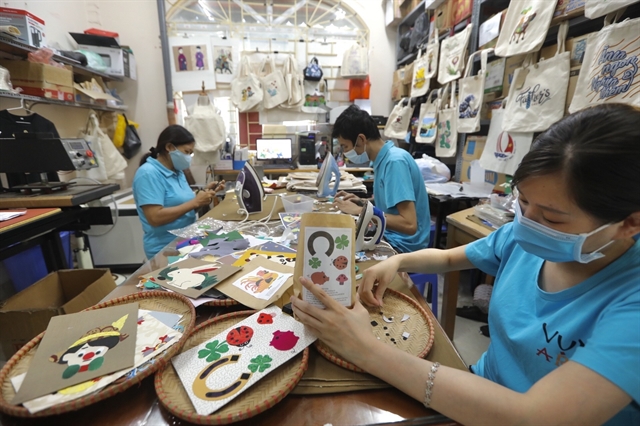 Society
Society

A project has been launched to enhance the resilience of social impact businesses (SIBs) and contribute to reducing the impact of COVID-19 on vulnerable groups, especially women and girls.

|
| Employees at a workshop of Vụn Art, a social impact business specialising in crafting handmade products from silk debris. — VNA/VNS Photo |
HÀ NỘI — A project has been launched to enhance the resilience of social impact businesses (SIBs) and contribute to reducing the impact of COVID-19 on vulnerable groups, especially women and girls.
“Leveraging Việt Nam’s Social Impact Business Ecosystem in Response to COVID-19” is an iSEE-COVID project, jointly launched by the UN Development Program (UNDP), the Ministry of Planning and Investment, and the Embassy of Canada to Việt Nam on Monday.
It will be implemented over three years with a total budget of 3.1 million Canadian dollars, funded mainly by Global Affairs Canada and some correspondent funds from UNDP and the Government of Việt Nam.
Social impact businesses are organisations that engage in both business activities and a commitment to positively impacting society and/or the environment as central tenets of their strategic operations. Balancing social and environmental aims with a commercial model allows them to sustainably solve social and environmental challenges.
Examples of SIBs can be social enterprises; social impact start-ups; inclusive businesses; and cooperatives where most members are vulnerable people.
UNDP’s study, in collaboration with the National Economic University and the University of Northampton, shows that 99 per cent of SIBs employ female staff, while 74 per cent have people from marginalised groups in their workforce. A typical SIB is micro-sized in personnel and revenue; 41 per cent of SIBs' leaders are female.
The project will apply an ecosystem approach to tackle the inter-connected and systemic challenges that SIBs face. It will improve the capacity of SIBs themselves; build the capacity of and coordination between SIB intermediaries and strengthen government policymaking capacities for enabling SIBs.
Canada Ambassador HE Paul Deborah said: “SIBs provide incredible value to vulnerable communities in Việt Nam in response to COVID-19, as well as contributing to sustainable and inclusive economic development. In partnership with UNDP Việt Nam and the Ministry of Planning and Investment, our shared ambition is to improve the effectiveness of SIBs, especially those led by women, as a means to address the social and gendered impacts of COVID-19. Furthermore, we aim to strengthen the SIB regulatory environment in order to enhance their social and environmental contributions in the communities they serve.”

|
The launching ceremony of the Leveraging Việt Nam's Social Impact Business Ecosystem in Response to COVID-19. — Photo courtesy of Canadian Embassy in Hà Nội.
The project prioritises support to SIBs in four key industries heavily impacted by COVID-19, namely sustainable agriculture, sustainable tourism, education, and health. These are also areas with largely female workforces. Many SIBs offer innovative solutions dedicated to reducing poverty rates among women and girls.
At the project’s launch, Deputy Minister of Planning and Investment Trần Duy Đông said: “With the commitment to always being at the forefront of innovation and reform, and at the same time ensuring effective social protection work to leave no one behind, the Ministry of Planning and Investment has implemented many practical programmes and activities to support vulnerable groups, such as: ‘For the community development’, and: ‘White Cane for the Blind in Việt Nam’. These programmes are sponsored by a number of vulnerable groups, including social impact businesses like KymViet, Vụn Art and Tâm Ngọc Cooperative."
The ministry highly appreciates the partnership and support of the Government of Canada and UNDP in launching the project, Đông said.
"It is expected that the project will contribute to improving the capacity of SIBs, helping vulnerable groups, including women, people with disabilities and ethnic minorities, to build capacity and strengthen coordination among intermediaries to support social impact businesses, as well as strengthening the capacity of State agencies in policy formulation and implementation, creating favourable conditions for the development of social impact businesses," he said.
The project is expected to support 300 SIBs with seed funding and market access, creating up to 9,000 jobs for vulnerable people. Around 90 SIBs will benefit from revenue increases and will develop plans to cope with COVID-19 and future shocks. Some 105 SIBs will have business plans that integrate gender and/or environmental climate change.
Meanwhile, at least four gender-responsive policies are expected to be developed or revised. An impact business network of at least 100 members will be established. This network will support an impact measurement and management system pilot for 5-10 SIBs.
UNDP Resident Representative Caitlin Wiesen highlighted the timeliness of the project in supporting vulnerable groups and businesses in overcoming the prolonged and damaging impacts of the COVID-19 pandemic. She emphasised the crucial role of the private sector in general, and the social impact businesses in particular, in recovering and building forward better.
“I strongly believe that the shared development vision and the commitment of innovation-enabling government, combined with the creativity and innovations of social impact business ecosystem stakeholders, will strengthen the resilience and accelerate the development of SIBs in Việt Nam,” she said.
“This, in turn, is foundational to leaving no one behind and achieving the SDGs,” she said. — VNS




